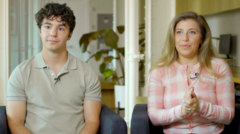Can Voiceover Artists' AI Lawsuit Move Forward After Judge's Ruling?

Understanding the Growing Concerns Over AI and Copyright: The Case of Voiceover Artists
As artificial intelligence (AI) continues to revolutionize various industries, it raises complex questions about intellectual property rights and the ethical use of creative content. A recent case involving two voiceover artists, Paul Skye Lehrman and Linnea Sage, highlights the legal challenges and emotional turmoil that can arise when technology intersects with artistry. This lawsuit against Lovo Inc., an AI voice startup, not only delves into allegations of copyright infringement but also explores broader issues of consent, contract violations, and deceptive business practices. This article will unpack the details of this case, the implications for voice artists, and how it reflects the ongoing dialogue surrounding AI and copyright law.
The Background of the Case
In 2024, Lehrman and Sage filed a proposed class-action lawsuit after discovering that their voices had been allegedly cloned and were available for sale on Lovo's text-to-speech platform, known as Genny. Initially approached by Lovo employees through the online freelance platform Fiverr, both artists were assured that their recordings would be used solely for “academic research purposes” and “internal use.” However, they later found that their voices were misappropriated without their consent, leading to significant emotional and professional repercussions.
The Role of AI in the Entertainment Industry
The incident raises questions about the role of AI in the entertainment industry, particularly its implications for voiceover artists. With the rise of AI technology, the ability to create voice clones has become increasingly sophisticated, leading to potential misuse of artists' work. In the case of Lehrman and Sage, the couple was shocked to hear AI-generated voices that closely resembled their own discussing the impact of AI on the industry.
Legal Developments: The Judge's Ruling
A federal judge in New York recently allowed the lawsuit to proceed, dismissing the artists' claims under federal copyright law but permitting their allegations of breach of contract and deceptive business practices to move forward. This decision signifies a potential turning point for artists seeking to protect their intellectual property in an age where technology makes cloning voices easier than ever.
The Arguments Presented by Both Sides
The legal arguments presented by both the artists and Lovo Inc. highlight the complexity of navigating AI and copyright issues:
- Artists' Claims: Lehrman and Sage argue that their voices were used without consent, constituting a breach of contract and deceptive business practices. They contend that the unauthorized use of their voices violates their rights as creators, impacting their livelihoods and personal identities.
- Lovo's Defense: Lovo's legal team described the artists' claims as a “kitchen sink approach,” suggesting that the allegations lacked actionable merit. They argue that the artists failed to provide sufficient evidence of how their voices were misused and contended that the case should be dismissed entirely.
The Emotional Toll on Artists
The ramifications of this case extend beyond legal disputes; they touch on the emotional well-being of the artists involved. Both Lehrman and Sage experienced shock and disbelief upon realizing that their voices were being used in a manner they had not authorized. The news not only affects their reputations but also raises questions about the broader implications for artists in an era where AI technologies can easily replicate human voices.
Impact on Voiceover Artists
For many in the creative community, the proliferation of AI voice cloning technology poses significant threats. Voiceover artists, in particular, may find their livelihoods jeopardized as companies increasingly turn to AI-generated voices for cost-effective solutions. Here are some potential impacts:
- Loss of Income: As AI voice technologies improve, companies may choose AI-generated voices over human talent, leading to a reduction in job opportunities for voiceover artists.
- Identity and Personal Branding: Voice artists often build their careers around their unique vocal qualities. The unauthorized use of their voices can dilute their personal brand and confuse their audience.
- Legal Vulnerability: Many artists may lack the resources or knowledge to protect their rights in the face of rapidly evolving technology.
The Broader Implications for Copyright Law
The ongoing lawsuit against Lovo Inc. is part of a larger trend where artists are increasingly litigating against AI companies for unauthorized use of their work. This trend raises vital questions about copyright law and its ability to adapt to technological advancements. Key issues include:
1. The Definition of Copyright in the Digital Age
As technology evolves, so too does the definition of copyright. Current laws may not adequately address the complexities of AI-generated content and the rights of original creators. The challenge lies in establishing clear guidelines that protect artists while allowing innovation to flourish.
2. Consent and Transparency
Consent is a crucial factor in copyright disputes, particularly when it comes to using an artist's voice. Transparent practices are essential for ensuring that artists are aware of how their work is being utilized and have the opportunity to grant or deny permission.
3. The Role of Contracts
Contracts play a critical role in protecting artists' rights. In the case of Lehrman and Sage, the initial agreement with Lovo was violated, leading to legal action. Ensuring that contracts are clear and enforceable is essential for safeguarding the interests of artists.
What Lies Ahead for the Case
As the case proceeds in the US District Court in Manhattan, it will set a precedent for how similar cases are handled in the future. The outcome could influence how AI companies navigate copyright issues and the use of artists' work. For Lehrman and Sage, the case represents a fight not just for their rights, but for the rights of all artists in an industry increasingly dominated by AI.
Potential Outcomes of the Trial
Several potential outcomes could arise from the trial, including:
- Compensation: If the court rules in favor of the artists, they may receive compensation for the unauthorized use of their voices.
- Injunctions: The court may issue injunctions against Lovo, preventing the company from using the artists' voices in the future.
- Legal Precedent: The case may establish important legal precedents regarding the use of AI in creative industries, shaping future legislation and industry practices.
Conclusion: The Future of AI and the Rights of Creators
The ongoing legal battle between voiceover artists and AI companies underscores the urgent need for clear regulations surrounding the use of AI technology in creative fields. As AI continues to evolve, artists must remain vigilant in protecting their rights and advocating for fair practices. The outcome of this case will not only impact Lehrman and Sage but could also reverberate throughout the creative community, influencing the future of how artists engage with technology.
As we look to the future, it is crucial to consider how we can balance innovation with the rights and needs of creators. The dialogue surrounding AI and copyright will continue to evolve, and it is up to both industry professionals and lawmakers to ensure that artists are protected in this new landscape. What do you think the future holds for voiceover artists in the age of AI? #AICopyright #VoiceoverRights #DigitalEthics
FAQs
What are the main claims made by the voiceover artists against Lovo Inc.?
The artists allege breach of contract, deceptive business practices, and unauthorized use of their voices as part of Lovo's AI training data.
Why did the judge dismiss the federal copyright claims?
The judge determined that the specific claims under federal copyright law did not meet the necessary legal standards to proceed.
What impact does this case have on the future of AI in creative industries?
The outcome may set legal precedents for how AI companies use artists' work, influencing future legislation and industry practices in copyright and consent.
Published: 2025-07-12 03:08:13 | Category: wales



